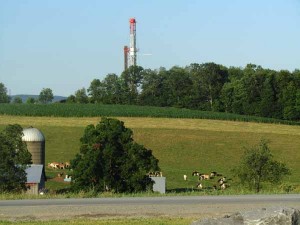EPA: Fracking water problems not widespread
-
Susan Phillips

Kimberly Paynter / Newsworks
The EPA says fracking does pollute drinking water, but the incidents are not “widespread.” ” credit=”
The Environmental Protection Agency says fracking can cause water contamination, but the problems are not widespread. The EPA released its long-awaited draft study today on the impact of hydraulic fracturing on drinking water supplies. Speaking on a conference call with reporters, the EPA’s science advisor and deputy assistant administrator of the office of research and development Thomas A. Burke said the study “greatly advances our scientific understanding of fracking’s potential impacts.” Burke also called the study “the most comprehensive” look at the impacts of fracking on drinking water.
“Based upon available scientific information, we found that hydraulic fracturing activities in the United States are carried out in a way that has not led to widespread systemic impacts on drinking water sources,” said Burke. “In fact the number of documented impacts on drinking water resources is relatively low when compared to number of fractured wells.”
Burke emphasized that the study is not a “health risk assessment,” nor is it meant to influence specific policy.
The Pennsylvania Department of Environmental Protection reports 256 incidents of private water supply impacts resulting from both conventional and unconventional (shale gas) drilling. Those incidents include water wells that have run dry as well as contamination.
The EPA’s report looked at the hydrologic cycle of water related to the entire unconventional gas drilling process, including water withdrawals, well completion, and waste water treatment, recycling, and disposal.
Technically, fracking is just one limited stage of the drilling process, but the study also found problems and risks associated with well integrity, subsurface migration of natural gas, and poorly treated wastewater and wastewater spills.
Perhaps as an indication of just how controversial the subject of fracking can be, both environmental groups and industry claimed the study backed up their assertions. The Sierra Club said the study confirmed that fracking pollutes water.
“The EPA’s water quality study confirms what millions of Americans already know – that dirty oil and gas fracking contaminates drinking water,” said Sierra Club executive director Michael Brune.
The American Petroleum Institute was similar in its praise of the study, but drew different conclusions.
“After more than five years and millions of dollars, the evidence gathered by EPA confirms what the agency has already acknowledged and what the oil and gas industry has known,”API Upstream Group Director Erik Milito. “Hydraulic fracturing is being done safely under the strong environmental stewardship of state regulators and industry best practices.”
But the EPA’s report attempts to shy away from the fracking controversy. Burke made clear that the report gave neither a thumbs up nor thumbs down to the safety of fracking.
“This is a study of how we can best protect our water resources. It’s not a question of safe or unsafe, it’s a question of understanding vulnerabilities, so that we can address those vulnerabilities, practice hydraulic fracturing in the safest possible way to reduce those risks and protect those resources.”
In March, Inside Climate News reported that the EPA was stymied by industry in their attempts to evaluate the safety of fracking on drinking water. A member of the agency’s Science Advisory Board told ICN that the study would not be able to deliver on its promise:
“We won’t know anything more in terms of real data than we did five years ago,” said Geoffrey Thyne, a geochemist and a member of the EPA’s 2011 Science Advisory Board, a group of independent scientists who reviewed the draft plan of the study. “This was supposed to be the gold standard. But they went through a long bureaucratic process of trying to develop a study that is not going to produce a meaningful result.”
When asked about the lack of data, EPA science advisor Thomas A. Burke told reporters that industry was cooperative.
“in general I think we did investigate and identify important gaps [in data],” said Burke. “But I wouldn’t say there was any particular source of those gaps nor point to one particular stake holder or component of those gaps, but rather, we are moving the science forward and making great progress in understanding the [fracking] process.”
















